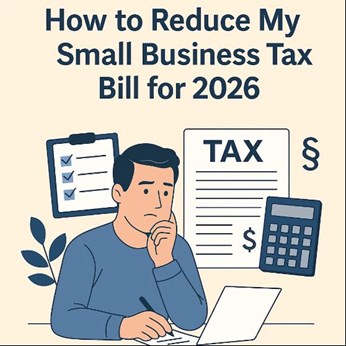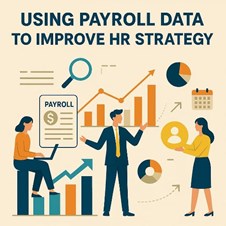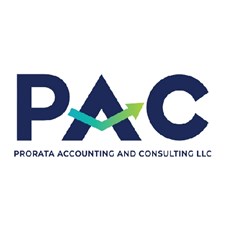How to Reduce My Small Business Tax Bill for 2026

Introduction: Smart Tax Planning Starts Now
As the 2026 tax season approaches, small business owners across the U.S. are already asking, “How can I reduce my small business tax bill for 2026?” The answer lies in early tax planning, strategic deductions, and using available tax credits. By understanding how to structure your finances and claim the right deductions, you can legally minimise your taxable income and keep more of your hard-earned money.
This guide covers practical, IRS-approved strategies every small business owner should know — whether you run a sole proprietorship, LLC, or S-Corporation.
1. Track Every Deductible Expense
One of the easiest ways to lower your small business tax bill is by maximising your tax deductions. Every business expense that is “ordinary and necessary” can reduce your taxable income.
Common Small Business Tax Deductions
- Office expenses: rent, utilities, internet, and software subscriptions.
- Business travel: airfare, hotel stays, car rentals, and meals during business trips.
- Marketing costs: website hosting, advertising, and social media promotions.
- Employee wages and benefits: salaries, health insurance, and retirement contributions.
- Home office deduction: if you work from home, a percentage of rent or mortgage, utilities, and internet may qualify.
2. Choose the Right Business Structure
- Your business structure affects how your income is taxed. Choosing the right one can significantly impact your total tax liability.
- Sole Proprietorship: Simple, but profits are taxed as personal income.
- LLC (Limited Liability Company): Offers flexibility and can be taxed as an S-Corp for savings.
- S-Corporation: Lets owners pay themselves a salary while reducing self-employment tax.
- C-Corporation: May benefit from the 21% flat corporate tax rate but faces double taxation.
- Consider consulting a small business tax advisor to determine which entity will best reduce your 2026 tax burden.
3. Take Advantage of Small Business Tax Credits
- While deductions lower taxable income, tax credits directly reduce the amount of tax you owe. This makes them even more valuable.
- Top Tax Credits for Small Businesses (2026)
- Research & Development (R&D) Credit: For businesses investing in innovation or technology.
- Work Opportunity Tax Credit (WOTC): For hiring veterans or individuals from certain groups.
- Disabled Access Credit: For making your business more accessible to people with disabilities.
- Energy-efficient equipment credits: For upgrading to sustainable systems or vehicles.
- Claiming eligible credits can save thousands of dollars when filing your 2026 small business tax return.
4. Invest in Retirement Plans
- Setting up a retirement plan not only helps your employees but also reduces your taxable income.
- Popular Retirement Plans for Small Businesses
- SEP IRA: Ideal for self-employed owners or small teams.
- SIMPLE IRA: Easy to administer and offers employee matching.
- 401(k): Higher contribution limits for bigger savings.
- Employer contributions are fully tax-deductible, and you may qualify for a startup plan tax credit if you establish a new plan in 2026.
5. Deduct Vehicle and Mileage Expenses
- If you use a vehicle for business, you can deduct car expenses using either:
- The standard mileage rate, or
- Actual vehicle expenses such as gas, maintenance, and depreciation.
- Keep accurate mileage logs and receipts to back up your claim during an IRS audit.
6. Prepay Certain Expenses
One smart year-end tax tip is to prepay expenses before December 31, 2025. This includes rent, insurance premiums, and advertising costs for early 2026. It allows you to deduct them in the 2025 tax year, effectively lowering your taxable income for that year and freeing up cash flow for 2026.
7. Hire a Professional Accountant or Tax Advisor
- Even if you manage your own bookkeeping, a certified accountant or small business tax professional can identify deductions and credits you might miss. They’ll also ensure your business remains compliant with IRS tax laws and new 2026 regulations.
- Regularly reviewing your financial statements with a professional can help uncover strategic tax-saving opportunities specific to your industry.
8. Don’t Forget Depreciation
- Depreciation allows you to deduct the cost of business assets such as equipment, computers, and furniture over time. Under Section 179, you can deduct the full purchase cost (up to a certain limit) in the year the asset is placed in service.
- This is particularly helpful for manufacturers, construction firms, and IT businesses investing in new tools or software in 2026.
9. Separate Personal and Business Finances
Keeping your business and personal accounts separate simplifies record-keeping and prevents IRS scrutiny. Use a dedicated business checking account and credit card for all transactions. This also makes it easier to document deductions when you file your 2026 small business tax return.
Conclusion: Start Planning Now for 2026
- Reducing your small business tax bill for 2026 isn’t just about understanding deductions and credits — it’s about ongoing strategy, compliance, and professional guidance. By pairing smart tax planning (like entity selection, depreciation, retirement contributions, and credits) with expert support, you can confidently lower your tax burden and sharpen your financial footing.
- Giri Lankipalle – Financial Services, based in Pleasanton, CA, offers full-suite business tax planning, financial planning, and IRS-compliance advisory services. They also specialise in college savings, life insurance, and long-term care planning, helping business owners balance immediate savings and long-term security. Engaging their services means you gain not just tax-saving tactics today, but a strategic roadmap for growth, compliance, and financial stability.
Searching for Financial & Taxation Services? Let’s make your search simple with professionals!
Take your Financial & Taxation Services to the next level with Sulekha. Boost your online visibility, connect with more clients, and grow effortlessly!
Blogs Related to Financial & Taxation Services

How Can You Use Payroll Data to Improve HR Strategy?
How Can You Use Payroll Data to Improve HR Strategy? Payroll isn’t just about paying employees—it’s a goldmine of business intelligence. When analysed strategically, payroll data reveals patterns that can transform your HR strategy

Is Your Bookkeeping a Mess? Are You Missing Out on Growth Opportunities?
Is Your Bookkeeping a Mess? Are You Missing Out on Growth Opportunities?

Need a Clearer Financial Picture? Why Compilation Services Can Help
Need a Clearer Financial Picture? Why Compilation Services Can Help. Understanding your company’s true financial health begins with accurate reporting. But not every business needs a full audit or review. For many small and mid-sized organisations,

Do You Need Clearer Financial Insights? What Can Modern Auditing Services Offer?
Do You Need Clearer Financial Insights? What Can Modern Auditing Services Offer? In today’s fast-paced business world, financial clarity is more than an advantage—it’s a necessity. Whether you run a small enterprise or a growing corporation, accurat

How Do You Find the Right Life Insurance Policy?
How Do You Find the Right Life Insurance Policy? Life insurance is more than a safety net—it’s a cornerstone of sound financial planning. Whether you’re protecting your family’s future, securing your business, or planning your estate, finding the ri

Why Is Investment Management Critical for High-Net-Worth Individuals?
Why Is Investment Management Critical for High-Net-Worth Individuals? Wealth accumulation is an achievement—but managing it effectively is an even greater challenge. For high-net-worth individuals (HNWIs), wealth management requires precision, fores




